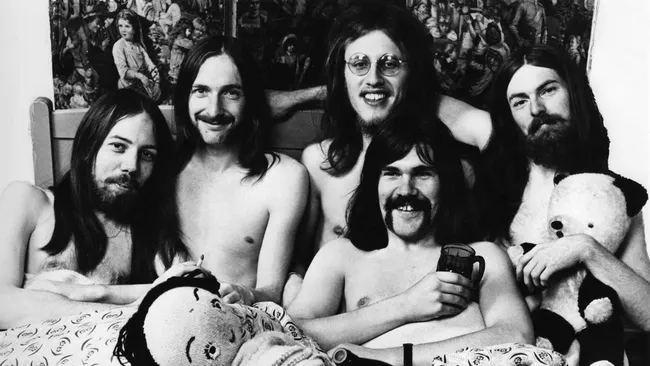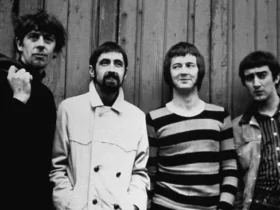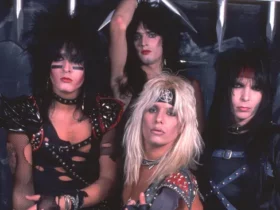Lindisfarne’s 1972 hit “Lady Eleanor” became an unexpected sensation, striking a chord with the British public despite its morbid theme. Frontman Alan Hull, reflecting on the song’s success, said, “It’s a very mystical song, but I know it’s about death. I wrote it almost in a trance.”
Inspired partly by Edgar Allan Poe’s 1839 gothic short story “The Fall Of The House Of Usher,” “Lady Eleanor” was among the many compositions Hull created before joining his talented folk-rock bandmates. While working as a psychiatric nurse in Newcastle, Hull wrote “Lady Eleanor” along with “Winter Song” and “Clear White Light” during a single overnight shift in 1968.
“Alan was a very good psychiatric nurse, though a bit unorthodox. He would take the patients down the pub or play the piano to calm them down,” recalled Lindisfarne drummer Ray Laidlaw.
The definitive version of “Lady Eleanor” appeared on Lindisfarne’s 1970 debut album “Nicely Out Of Tune” (UK No.8). An earlier version resurfaced recently on the 2024 Hull rarities collection “Singing A Song In The Morning Light: The Legendary Demo Tapes 1967-1970.” This demo, credited to ‘Alan Hull And Brethren,’ differs notably from the famous version, especially with Ray Jackson’s mandolin part still in development and the absence of the spectral organ that defined the final track’s haunting atmosphere.
Lindisfarne, signed to Charisma Records in 1970, were known as five unlikely lads on a prog rock label. Early tour-bus jaunts with label mates, including Van der Graaf Generator and Genesis, became legendary.
In 2023, Jackson recalled their early days: “Van der Graaf Generator at the back smoking jazz tabs, us in the middle with a crate of Newcastle Brown Ale, and Genesis down the front doing crosswords.”
Hull’s politically charged writing often explored themes of the North/South divide and class disparities. When “Lady Eleanor” was first released in May 1971, it initially went unnoticed. However, after the success of “Meet Me On The Corner” in 1972, a single from their platinum-selling 1971 album “Fog On The Tyne,” “Lady Eleanor” was relaunched and became a huge hit.
Despite its dark theme, “Lady Eleanor” captivated audiences with its lyrics depicting ‘A host of golden demons screaming lust and base desire’ and the haunting invitation of Eleanor to ‘the land of the dancing dead.’
“When Alan was working at St Nicholas Hospital, he had access to various mind-altering drugs, including LSD,” Jackson said in 2023. “That might be where ‘Lady Eleanor’ came from. But he also told me it was influenced by Traffic’s ‘Forty Thousand Headmen.’ He didn’t lift it, and the two songs are very different, but if you listen to it, you’ll hear some similarities.”
Poe’s Rodrick Usher and Lady Eleanor are mentioned in the first verse, but Hull’s song also echoes Poe’s 1842 “Eleonora,” with themes of madness, guilt, and a heroine visiting from beyond the grave.
Laidlaw remembered Hull’s surprise at the song’s success: “I can’t believe all these people are buying a single about death! It was an unusual song and pretty unique to him. Alan had the same upbringing as the rest of us, but he was so articulate, probably because he was so well-read. I think ‘Lady Eleanor’ is about insecurity, fear of death, and madness. A lot of it came from Alan working in the psychiatric hospital. He got so much inspiration from the patients there and the things they said.”
Produced by John Anthony, Charisma Records’ in-house producer, the recording of “Lady Eleanor” was crucial to Lindisfarne’s success. “John was very supportive in bringing what we had into focus,” noted Clements, comparing the band’s potential to The Band.
The success of “Lady Eleanor” and “Meet Me on The Corner” transformed Lindisfarne’s career, taking them from playing small venues like The Huddersfield Builder’s Exchange to major venues.
Alan Hull passed away in 1995 at the age of 50, but his legacy endures. Artists like Sting, Elvis Costello, and Alex Turner of the Arctic Monkeys admire his songwriting. Recently, Geordie star Sam Fender covered Hull’s “Winter Song,” a heartfelt anthem for the homeless. Yet, “Lady Eleanor” remains Hull’s finest achievement, with Laidlaw particularly fond of the 70s Los Angeles funk band American Gypsy’s cover version, describing it as “like Shaft by Isaac Hayes or something.”





